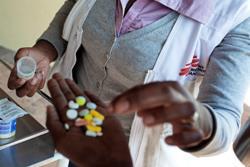More than 1000 learners, teachers share two toilets


About a year ago, Gedlembane Secondary School received 13 new toilets to ameliorate a shortage of loos that led students and teachers to begin employing the bucket system. However, a school water shortage means the new toilets have been unusable.
According to students and former members of the school governing body, water is only delivered twice a month to fill the school’s water tank and because of that the school can go days without water.
Meanwhile, improvised bucket toilets are often not emptied regularly enough and some teachers to drive to the nearest petrol station to use decent toilets. The door to one of the two pit latrines is also allegedly broken so pupils say they must ask a friend to hold the door close to allow them to go to the bathroom in private.
Students say that they are tired of teachers keeping quiet about the situation.
“Our teachers weren’t speaking out so we kept quiet as well but now it has come to the point where… things have to change because there is no respect for teachers and students,” said Fikile Sibiya.*
Maja Nkambule was a former member of the school governing body who stepped down in June. He claims these issues have been reported to the Gert Sibande District Department of Education but little has changed.
“The current situation is bad,” he told OurHealth. “To be honest, the buckets toilets aren’t properly maintained, and sanitation and cleanliness… are being compromised”.
Citizen school audit underway
[quote float= right]To be honest, the buckets toilets aren’t properly maintained, and sanitation and cleanliness… are being compromised”
In 2014/15, the Department of Basic Education said it would strive to provide 1257 schools with water and 878 schools with sanitation services. According to the department’s latest annual report, it only managed to reach about 35 percent of targeted schools citing challenges including procurement delays and poor work by contractors.
However, the department had pledged all schools would have access to potable water and adequate sanitation by the end of 2014/15, according to a 2014 South African Human Rights Commission report on water and sanitation. The report was released shortly after the death of six-year-old Limpopo learner Michael Komape, who drowned in an open pit latrine at his school, made national headlines.
In Mpumalanga, Department of Education Spokesperson Jasper Zwane said department had made arrangements to fast track the installation of a borehole at Gedlembane Secondary School to address the school’s water shortage.
He added the department continues to prioritise the provision of water, sanitation and electricity to schools in the province.
“Our view is that the challenge at the school in question will be a thing of the past very soon,” said Zwane in late October.
As of 15 December, neither the borehole nor the 13 new toilets were in use at the school.
According to the education non-governmental organisation Equal Education, the South African government has committed to eliminate all mud schools as well as those with poor infrastructure by 29 November 2016. Additionally, there must be no school without any access to sanitation, water or electricity, added the organisation.
Equal Education is currently asking students and parents to audit schools in their areas to see if they meet national norms and standards via an online and SMS survey. To participate in the survey via SMS, text the word “AUDIT” to 079 173 1840 at standard rates. – Health-e News.
*Name changed to protect the identity of the child
An edited version of this story was also published on Health24
Author
Republish this article
This work is licensed under a Creative Commons Attribution-NoDerivatives 4.0 International License.
Unless otherwise noted, you can republish our articles for free under a Creative Commons license. Here’s what you need to know:
You have to credit Health-e News. In the byline, we prefer “Author Name, Publication.” At the top of the text of your story, include a line that reads: “This story was originally published by Health-e News.” You must link the word “Health-e News” to the original URL of the story.
You must include all of the links from our story, including our newsletter sign up link.
If you use canonical metadata, please use the Health-e News URL. For more information about canonical metadata, click here.
You can’t edit our material, except to reflect relative changes in time, location and editorial style. (For example, “yesterday” can be changed to “last week”)
You have no rights to sell, license, syndicate, or otherwise represent yourself as the authorized owner of our material to any third parties. This means that you cannot actively publish or submit our work for syndication to third party platforms or apps like Apple News or Google News. Health-e News understands that publishers cannot fully control when certain third parties automatically summarise or crawl content from publishers’ own sites.
You can’t republish our material wholesale, or automatically; you need to select stories to be republished individually.
If you share republished stories on social media, we’d appreciate being tagged in your posts. You can find us on Twitter @HealthENews, Instagram @healthenews, and Facebook Health-e News Service.
You can grab HTML code for our stories easily. Click on the Creative Commons logo on our stories. You’ll find it with the other share buttons.
If you have any other questions, contact info@health-e.org.za.
More than 1000 learners, teachers share two toilets
by cynthiamaseko, Health-e News
December 16, 2015



